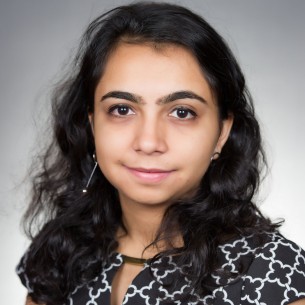 By Astha Thakkar, MBBS
By Astha Thakkar, MBBS
“We are expecting a surge.” “Things are going to change.” “We don’t know how long this will continue.” These statements became the center of conversation in mid-March when New York City was starting to see a steep rise in COVID-19 cases. Every week we would hear about changes that were being implemented, or were going to be implemented, around the workflow of our clinics, infusion center, and the oncology wards to combat COVID-19. Office visits became tele-visits, infusion centers started screening everyone and testing anyone who had symptoms, one of the infusion center sites had to be closed as that hospital was declared a “COVID hospital” across the health care system. Changes that would typically take weeks to implement now happened overnight. As we saw the hospital fill with patients with COVID-19, stricter measures were placed to stop the spread of the virus and protect patients with cancer, with every effort being made continue the treatment for their malignancy.
As all of this was happening, a hospital-system wide deployment of residents, fellows, and attendings took place. Oncology fellows became the frontline providers for the hematologic malignancy and solid tumor floors of the hospital. All the scheduled fellowship educational activities came to a halt. My experience over the last 7 weeks, having worked on both the floors and cared for a wide variety of patients with both cancer and COVID-19, with our resources spread extremely thin, has been both mentally and physically exhausting and an emotionally challenging experience. Even without a pandemic, a patient with acute myeloid leukemia spends at least 4 weeks in the hospital during induction therapy. Going through that course of therapy in a time when family members are not allowed to visit is unimaginable.
Our disease management decisions were now tougher than ever. A patient who tested positive for COVID-19 concurrently had rapid progression of their underlying diffuse large B-cell lymphoma. Do we start combination chemo-immunotherapy now when their COVID-19 illness seems mild? What if the potentially lifesaving chemo-immunotherapy causes worsening of their respiratory status? These are questions to which there were no easy answers.
The hardest moments came when we had to tell patients’ families that their loved ones were not doing well but that visitation would be limited. As an oncology trainee, I have been a part of many goals-of-care discussions when a patient’s cancer was chemo-refractory or progressing despite multiple lines of therapy. Even before we experienced the surge, the discussions during the pandemic were particularly difficult as we began to hold them over the phone via conference calls rather than in person. It reminded me of the important role nonverbal cues and body language play in having these sensitive discussions. As consultations have moved to e-consults, it became harder to explain to a patient with newly diagnosed malignancy what their road ahead is going to look like.
As we start seeing effects of social distancing measures in New York City, with a decrease in the number of new COVID-19 cases and a decline in number of deaths, let’s not forget how many patients succumbed to this disease. I feel privileged to have had the opportunity to take care of a very vulnerable patient population during this pandemic, and I feel humbled, now more than ever, to have been a part of their journey.
The pandemic is going to leave us with a new normal. As we start to think about re-opening, I cannot help but reflect on the lessons learned from this adverse time, from adapting to a hospital system-wide change, to adapting within our division of oncology, to adapting a new routine at home. I cannot help but wonder how substantially it has tested our resilience, as health care providers and, above all, as humans.
Dr. Thakkar is a hematology-oncology fellow in the Division of Medical Oncology at Montefiore Medical Center and Albert Einstein College of Medicine. Follow her on Twitter @personifier.


Recent posts